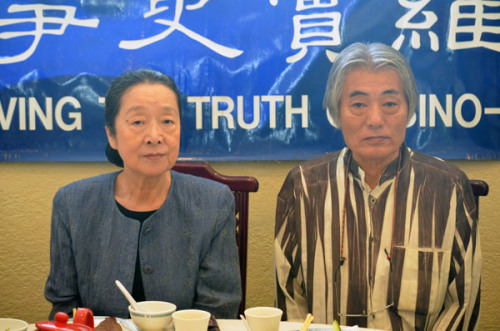
The Eye Holds the Truth, a new play by Yoshiji Watanabe (right) and his wife Kazuko Yokoi, will present three shows in the San Francisco Bay Area on Thursday through Aug 29. (Lia Zhu/China Daily)
A Japanese director, son of a war criminal, and his actress wife will present their play on "comfort women" in the San Francisco Bay Area as a form of atonement for the atrocities inflicted by Japanese soldiers on other Asians during the World War II era.[Special coverage]
The monodrama, The Eye Holds the Truth, was written and directed by Yoshiji Watanabe in 2013, whose wife, Kazuko Yokoi, acts in the play.
The six-act play details the suffering of two Korean comfort women, one Chinese comfort woman, and a child born by a Chinese comfort woman after the mother was raped by a Japanese soldier.
Yokoi plays each of the four characters. In the prologue and epilogue, she also recalls her own experience in post-war Japan and her "unconscious feeling of guilt".
Sponsored by the Global Alliance for Preserving the History of World War II in Asia, this play is scheduled for three shows at the San Francisco Public Library, Korean Presbyterian Church, and the Visual & Performing Art Center of De Anza College in Cupertino, starting on Thursday and running until Aug 29.
It's the third time the couple have brought their plays to the United States, following Reunion in 2001 and The Rain on Dec 13 in 2007. It's the first time that The Eye Holds the Truth will be performed outside of Japan.
"We have given 41 shows (of the new play) in Japan, and it was very well received each time, though there was not a large audience," Watanabe, 68, told China Daily through a translator.
Watanabe's father was a Japanese Imperial Army officer stationed in Harbin in 1931. After the war, he was barred from public service for three years as a Class C war criminal. Watanabe recalled that his father never spoke about his experience in China but suffered in silence and often took it out on his wife and son in acts of violence.
In 1991, Watanabe and his wife visited Harbin, where he saw a photo of a Japanese Kwantung Army officer, who was laughing with his sword held high in his hands. At his feet were the heads of several Chinese young men, beheaded and carefully displayed.
"Japan was engaged in the war of invasion and committed crimes as the assailant, in which a lot of innocent people were humiliated and brutally murdered. There are also survivors who are even now continually suffering from the deep scars they had unreasonably received by the Japanese," Watanabe wrote in his "confession".
In the same year, he created Reunion, a personal testimony of the sufferings inflicted upon both the Chinese and Japanese people by Japanese militarists during World War II. His following play The Rain on Dec 13 was based on the Nanking Massacre, which happened on Dec 13, 1937.
Bearing the sins of his father, Watanabe said the meaning of his life lies in telling the truth. The couple also decided not to have any children because of their profound guilt.
Many young people in Japan do not know the real history of the war era, and they think it has nothing to do with them, Watanabe said.
Among the show's guests is Patrick Zhou, 16, a Chinese-American student in Cupertino. His oil painting, depicting a dark scene of Japanese bombers in the background and Japanese Prime Minister Shinzo Abe and comfort women in the foreground, will be displayed at the venues hosting the shows.
Zhou said he has been researching the history of the Chinese People's War Against Japanese Aggression for four years and found there was little in his textbooks about it.
"It's important for kids to know the real history and learn from mistakes," he said.
Watanabe said there is a small group of young people who call themselves "Shield" in Japan, and what they are doing is similar to what Zhou does in the US. He said he would like to connect Zhou with the group so they can exchange ideas and learn from each other.


















































